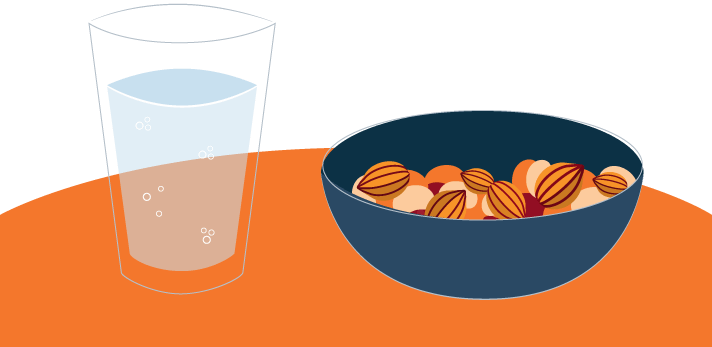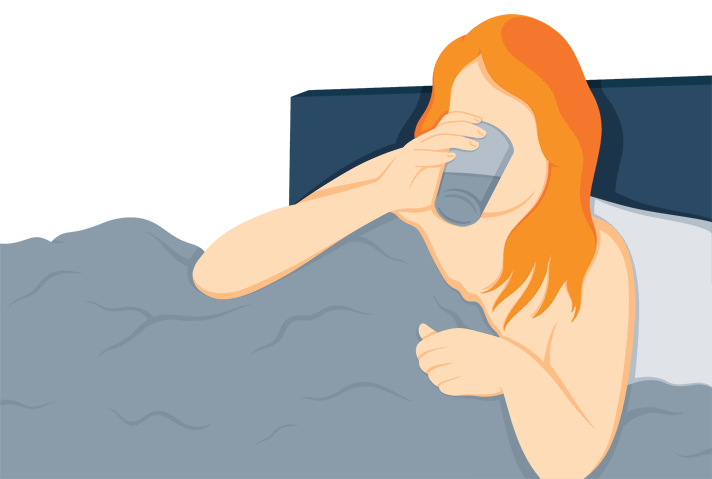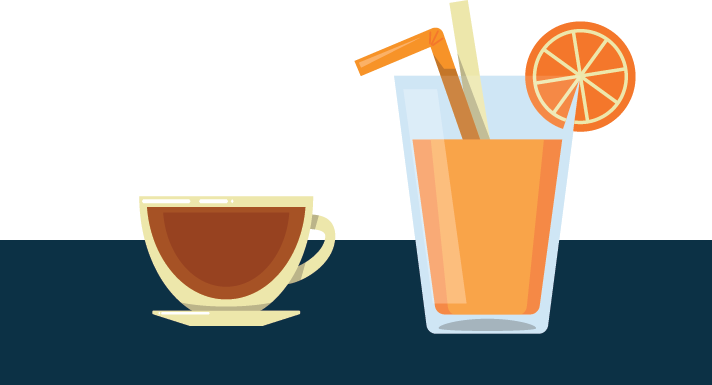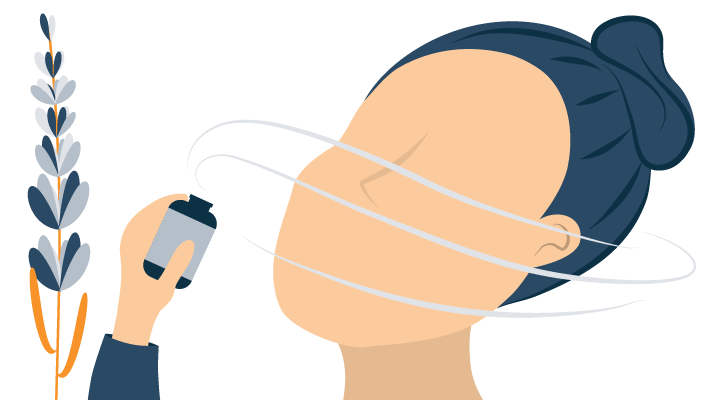Many people struggle to stay awake throughout the entire day. Sometimes environmental factors may be impacting their energy levels. Other times, poor sleep quality during the night can cause someone to doze off in the middle of the day as their bodies try to catch up on rest. While it would be nice to go back to bed, sometimes our busy schedules simply won’t allow it.
Read on for some of the top tips and tricks to learn how to stop falling asleep. You can employ these tips to combat daytime sleepiness and make it through your work or school day.
How To Stay Awake Naturally
Go for a Brisk Walk
If you need a quick energy boost, consider going for a walk outside. A study1 conducted by Robert Thayer, P.h.D., found that walking briskly, even for just 10 minutes, could provide more energy and less tension than a candy bar. So, while you may think a sugary snack could energize you, a brisk walk is a better — and healthier — alternative.
Take a Quick Nap
Depending on your daily schedule, you might be able to fit in a quick power nap. If your body is tired, sometimes just catching up on 20 minutes of shut-eye is exactly what you need to keep going. To make the most of your nap, there are several tips you should follow. First, make sure you avoid napping too late in the day as this could affect your ability to fall asleep at night. Second, limit the time you spend napping to only 30 minutes or less. If you sleep too long, you risk waking up groggy, which could make things worse. Plus, sleeping too long could make it harder for you to sleep later on.
Find Out More: Benefits of Power Nap
Rest Your Eyes
Eye strain2 can make it difficult for some people to keep their eyes open, which in turn could cause you to feel tired. To help alleviate eye strain, take a break from staring at computer screens, cell phones, or spreadsheets, and allow yourself some time to close your eyes and recharge. If you’re regularly on computers or other technological devices, consider investing in blue light-blocking glasses, which are known to help reduce eye strain.
Eat a Healthy Snack
Low blood sugar could cause some people to feel exhausted at random times. Therefore, eating a healthy snack could help regulate blood sugar levels3, which should aid in increasing energy and eliminating sugar crashes. Examples of good foods for an afternoon snack include nuts, low-fat dairy products like cheese or yogurt, or fruits and vegetables.
Start a Conversation With Someone
Find ways to energize the mind, which may also increase physical energy and alertness. Start a conversation about an engaging topic such as your favorite shows or something mentally stimulating like politics or career projects. Having another person to turn your attention to could help keep the sleepiness at bay.
Keep the Lights on
People generally sleep better in dark rooms because light can interfere with our circadian rhythms. Light tells the body it’s time to be awake, whereas darkness signals the body it’s time for sleep. Therefore, you can use light to your advantage to help you stay alert. Try adding a brighter light source to give you more energy. We also mentioned earlier that a brisk walk could help keep you from falling asleep. This is especially true on a sunny day, with the sunlight providing even more of an energy boost.
Practice Deep Breathing
Deep breathing4 is another technique that could keep you alert. These breathing exercises increase the levels of oxygen and nutrients in the body, and according to experts, this allows your organs to function at their best, giving you more energy in the process. Taking deep breaths has other benefits as well, including reduced stress, a stronger immune system, and better circulation.
Switch Tasks
Monotony could cause someone to feel bored and eventually sleepy during the day. Instead, try switching things up to keep your mind sharp and focused.
Start by noting the time of day when you have the most energy. Is it the morning? If this is the case, reserve the tasks that require the most attention to detail during this time when you’re naturally at your peak performance.
Then, if you regularly experience an afternoon lull, try mixing up your routine to get your mind and body stimulated. This would be an excellent time for a walk, deep breathing exercises, a healthy snack, or even a workout class if your schedule permits it. Once you get some energy back in your system, you’ll be ready to return to your work or school assignments.
Hydrate Yourself
We normally look to coffee to keep us alert, but you might consider reaching for a water bottle instead. One of the symptoms of dehydration5 is feeling tired, so consuming more water is an excellent way to help revitalize you during the day.
Exercise
Exercise can help wake the body and mind by releasing endorphins and getting the heart rate up. Like deep breathing, physical activity helps get more oxygen and nutrients to your body, which creates more energy. Go for a quick jog, do some light cardio like jumping jacks, or keep a pedal bike under your desk.
Go to Bed Early
If you usually feel sleepy throughout the day, you may not be getting enough shut-eye during the night. Experts say adults should you between 7 and 9 hours of sleep each night.
However, if you’re staying up until Midnight and waking up at 6:00 a.m., this means you’re likely sleep-deprived. In some cases, you might be getting 7 hours a night, but your body may be better off with 8 or 9 hours. Try going to bed earlier and seeing if the extra time asleep has you feeling better during the day.
Drink Coffee
Many coffee drinkers rely on a good cup of Joe to get them going in the morning. However, that doesn’t mean you should be sipping coffee all throughout the day. Caffeine6 can stay in your system for up to 6 hours, which means if you have coffee too late in the day, it may be harder for you to sleep at night. Generally, it’s okay to sip coffee in the morning and early afternoon, but 3:00 p.m. is a good time to cut off your caffeine intake for the day.
Give Yourself A Massage
A quick massage can boost circulation7, promoting energy and alertness. Experts recommend rubbing between the thumb and forefinger or massaging up the back of the neck to the scalp. Gently massaging the earlobes may also help stave off that sleepy feeling.
How to Stay Awake at Work or in a Meeting
Maintain Eye Contact
Being around other people should provide stimulation that can increase your energy levels. Find someone to talk to, preferably in person so that you can look them directly in the eye. This should bring the focus to them and away from your tired state.
Keep Scented Products Around
Scents can be a great way to feel more invigorated and improve your overall mood. Keep a small bottle of peppermint oil or a favorite citrus scent in your desk or bag and inhale deeply for a quick pick-me-up. Rosemary, eucalyptus, and lemongrass scents have also been known to increase energy.
Mind Your Posture While Seated
A study from Health Psychology8 points to posture as a surprising factor in energy levels. Those who sat up straight at their desks reported an increase in energy and interest. If you find yourself slumping over in your exhaustion, try sitting up straight as an arrow and see if you notice a positive change.
Splash Water on Your Face
Throwing cold water on your face should give you a much-needed mid-day jolt, helping you to stay awake. This may also be a good way to cool off if it’s a hot day since the heat could make you feel even more sleepy.
Chew a Piece of Gum
Chewing gum is another easy way to wake yourself up. Researchers found that gum chewing9 can boost energy levels. Earlier, we recommend peppermint as an energy-promoting scent, so consider getting some peppermint-flavored gum specifically.
How to Stay Awake in Class
As kids reach adolescence, their biological clocks shift10, which means they’re more inclined to stay up late. Of course, this can be a problem if your school day still starts early, which is why many teens may need help trying to stay awake in class.
Many of the suggestions we provided above can also work for students, such as drinking more water, splashing cold water on your face, and doing deep breathing exercises. While you may not be able to start up a conversation in the middle of class, use the time in between classes to say a quick hello to a friend rather than looking at your phone. Speaking with a friend can give you a quick energy boost before the next class begins.
Another thing teens will have to be mindful of is all-nighters, which is when someone stays up all night, usually to study for a test or finish an assignment. In some cases, you may just be restless before a big exam and have trouble going to sleep. All-nighters aren’t ideal, but if they happen, you can help yourself to stay awake throughout the day.
Your brain should increase activity in certain areas to help make up for your lack of sleep. However, you should avoid multitasking since you won’t be able to focus as well, yet another reason why these aren’t ideal for students.
Exercise, energy-boosting foods, or a splash of cold water could help keep you going. Your body may also naturally adjust your level of sleepiness to keep your circadian rhythm on track. You may feel most tired in the early morning before this adjustment period takes place.
If you’re a junior or senior in high school and are now driving, find a ride to school. You should avoid getting behind the wheel because drowsy driving increases your risk of an accident.
By the time you get home, you may be anxious to get to bed. However, this could throw off your sleep schedule. Instead, try to stay awake until your regular bedtime so that you can get back on schedule.
When to Seek a Doctor’s Advice
Any time you feel that your exhaustion or sleep deprivation is interfering with your health, safety, or daily activities, it’s time to consult a medical professional. If home remedies cause any negative side effects, stop using them immediately and ask your doctor for advice on how to care for your sleep cycle. You may just have a sleep disorder.
Nodding off at odd hours can happen to anyone for a variety of reasons. The good news is that you can find different ways to address this issue and should strive to find the healthiest options that work best for you.
Try healthy activities like energy-boosting snacks, exercise, or a quick nap to get you through your most sluggish times, and these don’t do the trick, reach out to a medical professional for help.
References:
- Thayer, Robert E. “Energy, tiredness, and tension effects of a sugar snack versus moderate exercise”. American Psychological Association. https://psycnet.apa.org/record/1987-14916-001. 1987.
- Wilson, Shayla. “Eye Strain”. Kellogg Eye Center, University of Michigan Health System. Last modified April 2015. https://www.med.umich.edu/1libr/Ophthalmology/comprehensive/EyeStrain.pdf.
- “Healthy eating for blood sugar control”. Harvard Health. https://www.health.harvard.edu/diseases-and-conditions/healthy-eating-for-blood-sugar-control. 2021.
- Riehl, Megan. “An Easy Way to Beat Stress — and Build a Healthier Life”. University of Michigan Health. https://healthblog.uofmhealth.org/lifestyle/an-easy-way-to-beat-stress-and-build-a-healthier-life#:~:text=By%20releasing%20endorphins%2C%20the%20body,function%20at%20an%20optimal%20level. 2016.
- “Dehydration”. National Health Service. Last modified August 9, 2024. https://www.nhs.uk/conditions/dehydration/.
- Drake Ph.D. F.A.A.S.M., Christopher., Roehrs, Ph.D., F.A.A.S.M., Timothy., Shambroom, B.S., John., Roth, Ph.D., Thomas. “Caffeine Effects on Sleep Taken 0, 3, or 6 Hours before Going to Bed”. Journal of Clinical Sleep Medicine Volume 9, Issue 11. https://jcsm.aasm.org/doi/10.5664/jcsm.3170. 2013.
- “Massage therapy improves circulation, eases muscle soreness”. University of Illinois Chicago. https://today.uic.edu/massage-therapy-improves-circulation-alleviates-muscle-soreness/. 2014.
- Nair, S., Sagar, M., Sollers, J. III, Consedine, N., & Broadbent, E. “Do slumped and upright postures affect stress responses? A randomized trial”. American Psychological Association. https://psycnet.apa.org/record/2014-37739-001. 2015.
- “Chewing Gum Can Reduce Calorie Intake, Increase Energy Expenditure, Nutritionist Finds”. University of Rhode Island. https://www.sciencedaily.com/releases/2009/10/091027132245.htm. 2009.
- “Sleep and Your Teen”. Nemours Kids Health. https://kidshealth.org/en/parents/sleep-problems.html#:~:text=The%20body%20releases%20the%20sleep,up%20later%20in%20the%20morning. 2021.
Jill Zwarensteyn
Editor
About Author
Jill Zwarensteyn is the Editor for Sleep Advisor and a Certified Sleep Science Coach. She is enthusiastic about providing helpful and engaging information on all things sleep and wellness.
Combination Sleeper



